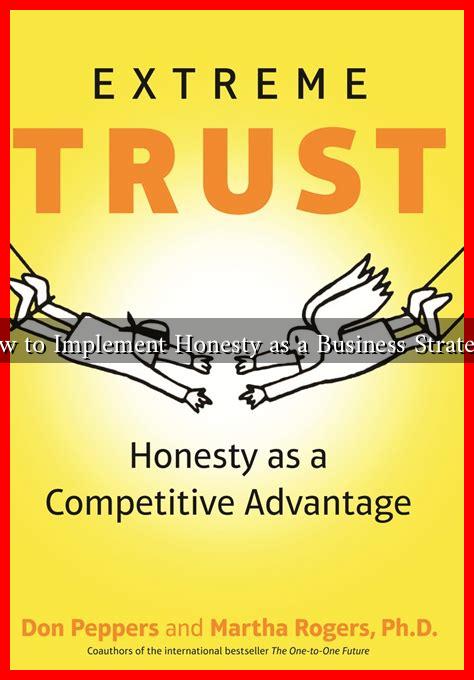-
Table of Contents
- How to Implement Honesty as a Business Strategy
- The Importance of Honesty in Business
- Strategies for Implementing Honesty
- 1. Establish Clear Values and Principles
- 2. Foster Open Communication
- 3. Be Transparent with Customers
- 4. Lead by Example
- 5. Implement Ethical Training Programs
- Case Studies: Companies That Excel in Honesty
- Conclusion
How to Implement Honesty as a Business Strategy
In today’s competitive business landscape, companies are constantly seeking ways to differentiate themselves from their competitors. One powerful strategy that is often overlooked is honesty. Implementing honesty as a core business strategy can lead to increased customer loyalty, improved employee morale, and a stronger brand reputation. This article explores how businesses can effectively integrate honesty into their operations and the benefits that come with it.
The Importance of Honesty in Business
Honesty is not just a moral obligation; it is a strategic advantage. According to a study by the Harris Poll, 81% of consumers say that they need to trust a brand before making a purchase. This statistic underscores the importance of transparency and integrity in building customer relationships. Here are some key reasons why honesty should be a cornerstone of your business strategy:
- Builds Trust: Trust is the foundation of any successful relationship, including those between businesses and their customers.
- Enhances Reputation: Companies known for their honesty are more likely to attract positive media attention and customer referrals.
- Increases Employee Engagement: A culture of honesty fosters an environment where employees feel valued and motivated.
- Reduces Risk: Transparent practices can help mitigate legal risks and avoid scandals that can damage a brand’s reputation.
Strategies for Implementing Honesty
Integrating honesty into your business strategy requires a deliberate approach. Here are several actionable strategies to consider:
1. Establish Clear Values and Principles
Start by defining your company’s core values and principles. These should reflect a commitment to honesty and transparency. Make sure these values are communicated clearly to all employees and stakeholders.
2. Foster Open Communication
Encourage open dialogue within your organization. This includes:
- Regular team meetings where employees can voice concerns and share feedback.
- Anonymous suggestion boxes to allow for candid input without fear of repercussions.
- Transparent communication about company goals, challenges, and performance metrics.
3. Be Transparent with Customers
Transparency with customers is crucial. This can be achieved by:
- Providing clear information about products and services, including pricing and potential drawbacks.
- Being upfront about any issues or delays that may affect customers.
- Encouraging customer feedback and responding to it openly.
4. Lead by Example
Leadership plays a critical role in establishing a culture of honesty. Leaders should model honest behavior in their decision-making and interactions. This sets the tone for the entire organization.
5. Implement Ethical Training Programs
Regular training on ethical practices can help reinforce the importance of honesty among employees. This can include:
- Workshops on ethical decision-making.
- Case studies of companies that have successfully implemented honesty as a strategy.
- Role-playing scenarios to practice handling difficult conversations with integrity.
Case Studies: Companies That Excel in Honesty
Several companies have successfully implemented honesty as a core business strategy, leading to significant benefits:
- Patagonia: Known for its commitment to environmental sustainability, Patagonia is transparent about its supply chain and the impact of its products. This honesty has cultivated a loyal customer base that values ethical consumption.
- Buffer: This social media management platform is renowned for its transparency in salary structures and company performance. By sharing this information openly, Buffer has built a strong culture of trust and engagement.
Conclusion
Implementing honesty as a business strategy is not just about ethical considerations; it is a smart business move that can lead to long-term success. By establishing clear values, fostering open communication, being transparent with customers, leading by example, and providing ethical training, businesses can create a culture of honesty that benefits everyone involved. As demonstrated by companies like Patagonia and Buffer, honesty can be a powerful differentiator in a crowded marketplace. Embracing this strategy not only enhances reputation but also builds lasting relationships with customers and employees alike.


